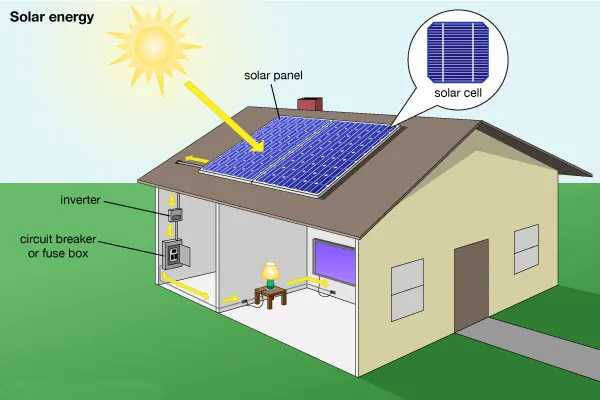The sun is an incredible and renewable resource that has the power to fuel life on earth and provide clean, sustainable solar energy to all of its inhabitants. In fact, more energy from the sun reaches our planet in one hour than is used by the entire population of the world in one year. The sun’s energy can be converted into electricity through solar photovoltaic (PV) modules (photo = light, voltaic = electricity).
We’re huge advocates for solar energy, but we recognize it isn’t the right solution for everyone. While solar is sustainable and ultimately cheaper than utility power in the long run, it also requires a significant up-front investment and doesn’t work for every property / roof type.
The ultimate question is whether the advantages of solar power outweigh the disadvantages. In this article, we’ll present the pros and cons of solar energy so that you can decide if going solar power makes sense for you.

Advantages of Solar Energy
Clean energy
Solar power is a clean source of energy that does not emit greenhouse gases or air pollutants. It helps to reduce the dependence on fossil fuels and contributes to environmental protection.
Renewable resource
Solar energy is a renewable resource, as it isderived from the sun, which is an infinite source of energy. It can help to conserve natural resources like coal, oil, and gas.
Reduced carbon footprint
Solar energy production does not emit carbon dioxide and other greenhouse gases, which helps to reduce the carbon footprint of the environment.
Low operating costs
Solar power systems have low operating costs as they do not require fuel for generation, and maintenance costs are also low.
Energy security
Solar energy generation can help to improve energy security by diversifying the energy mix and reducing reliance on a single source of energy.
Energy independence
Traditionally, most people depend on the utility company to supply them with power. When the grid goes down, going without power for an extended period of time can be a helpless feeling.
If you own a solar power system with energy storage, you can keep generating power during emergencies. That peace of mind is invaluable if you live in a place with an unreliable power grid, or are regularly threatened by severe weather conditions like tornadoes and hurricanes.
Utility power also restricts people who want to live off the grid, like a remote hunting cabin. Solar can generate energy where it would be too expensive to run power lines.
It’s liberating to have complete control over where and how you produce energy. And with electricity costs rising, it also feels great to lock in a fixed rate for your electricity over the next few decades.
Related Solar Energy Products
Disadvantages of Solar Energy
It takes up a lot of space.
Standard solar panels measure 39” wide by either 66” to 72” tall (for 60-cell and 72-cell panels, respectively).
To offset the national average of 897 kWh of electricity per month, you’d need at least 24 panels. In an 8×3 configuration, that system will be 26 feet wide by 44 feet tall. That’s going to take up a lot of room on your roof or in your yard.
Most people opt for a roof mount because it takes advantage of space that would otherwise go unused. If you need to design around odd angles and obstructions, you can always split the panels into sub-arrays.
Energy storage is expensive.
Batteries are the single most expensive component to a solar power system. Not all systems require batteries, but they become mandatory when you go off the grid. They are also required if you need to supply backup power to your grid-tied property.
Grid-tied systems don’t automatically provide backup power during outages. That’s a common misconception. For backup power, you need a grid-tie system with energy storage – essentially, a battery designed to work with grid-based systems.
Expect to pay a lot more money when you add batteries to a system. Battery banks cost at least a few thousand dollars, and if you buy high-end lithium batteries for a full-scale off-grid system, that’s easily a 5 figure investment into the batteries alone.
Furthermore, batteries don’t last as long as the other parts of your system. Lead-acid battery warranties range from 1 to 7 years, meaning you’ll replace them 4 or 5 times before the panel warranty is up.
Lithium batteries justify their high price tag by lasting 10-15 years, but you’re still in for at least one replacement over the life of your system.
Dependency on weather
Solar power generation is dependent on weather conditions, and output may vary according to cloud cover and other atmospheric conditions.
Waste disposal
Solar panels may contain toxic materials, and their disposal may pose environmental hazards if not handled properly.
Consolution
PV modules absorb sunlight and convert the energy into a usable form of electrical current. The sun shines all over the world, making solar electricity viable anywhere. Because solar can be paired with batteries for energy storage, solar electric systems can be independent of the utility grid, making them cost-effective for remote locations. Solar modules have no moving parts making maintenance costs low, and they are highly reliable with a long service life of 25+ years of guaranteed electricity. Solar electricity relies on the sun as its fuel source, so there is no need to drill for petroleum-based fuels, refine them, or deliver them to the site. As you can see, there are a lot of advantages of solar energy.
The Articles You may Like
- What is the difference between solar system off grid vs hybrid?
- Best Solar Inverter Plays an Important Role in Solar Power Systems for Homes
- What Deep Cycle Battery 12V Do I Need
- GMP3K 24v off grid solar inverter 3000w
- How many batteries are needed for a 5000 watt solar system?
- Solar inverter – Wikipedia